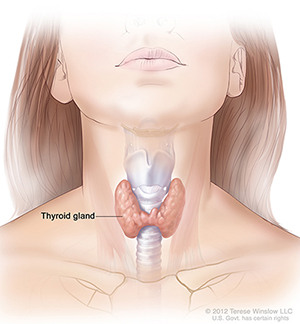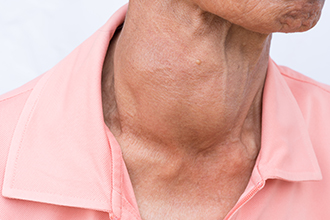On this page:
Hashimoto’s Disease
Hashimoto’s disease is an autoimmune disorder that can cause hypothyroidism, or underactive thyroid. With this disease, your immune system attacks your thyroid. The thyroid becomes damaged and can’t make enough thyroid hormones.
The thyroid is a small, butterfly-shaped gland in the front of your neck. Thyroid hormones control how your body uses energy, so they affect nearly every organ in your body—even the way your heart beats. Without enough thyroid hormones, many of your body’s functions slow down.

Does Hashimoto’s disease have another name?
Hashimoto’s disease is also called Hashimoto’s thyroiditis, chronic lymphocytic thyroiditis, or autoimmune thyroiditis.
How common is Hashimoto’s disease?
Hashimoto’s disease is the most common cause of hypothyroidism in the United States, and affects about 5 people out of 100.1
Who is more likely to develop Hashimoto’s disease?
Hashimoto’s disease is at least 8 times more common in women than men.2 Although the disease may occur in teens or young women, it more often appears between ages 40 and 60.2 Your chance of developing Hashimoto’s disease increases if other family members have the disease.
You are more likely to develop Hashimoto’s disease if you have other autoimmune disorders. Conditions linked to Hashimoto’s disease include
- Addison’s disease, a hormonal disorder
- autoimmune hepatitis, a disease in which the immune system attacks the liver
- celiac disease, a digestive disorder
- lupus, a chronic, or long-term, disorder that can affect many parts of your body
- pernicious anemia, a condition caused by a vitamin B12 deficiency
- rheumatoid arthritis, a disorder that affects the joints and sometimes other body systems
- Sjögren’s syndrome, a disease that causes dry eyes and mouth
- type 1 diabetes, a disease that occurs when your blood glucose, also called blood sugar, is too high
- vitiligo, a condition in which some parts of the skin are not pigmented
What other health problems could I have because of Hashimoto’s disease?
Many people with Hashimoto’s disease develop hypothyroidism. Low levels of thyroid hormones can contribute to high cholesterol that can lead to heart disease. Rarely, severe, untreated hypothyroidism may lead to myxedema coma, an extreme form of hypothyroidism in which the body’s functions slow to the point that it becomes life-threatening. Myxedema coma requires urgent medical treatment.
Is Hashimoto’s disease during pregnancy a problem?
Without treatment, hypothyroidism can cause problems for both the mother and the baby. However, thyroid medicines can help prevent problems and are safe to take during pregnancy. Learn more about causes, complications, diagnosis, and treatment of hypothyroidism during pregnancy. Many women taking thyroid hormone medicine need a higher dose during pregnancy, so you should contact your doctor right away if you find out that you’re pregnant.
What are the symptoms of Hashimoto’s disease?
Many people with Hashimoto’s disease have no symptoms at first. As the disease slowly progresses, the thyroid usually gets larger and may cause the front of the neck to look swollen. The enlarged thyroid, called a goiter, may create a feeling of fullness in your throat, though it is usually not painful. After many years, or even decades, damage to the thyroid causes it to shrink and the goiter to disappear.

The hypothyroidism of Hashimoto’s disease often is subclinical—mild and without symptoms—especially early in the disease. As hypothyroidism progresses, you may have one or more of the following symptoms:
- tiredness
- weight gain
- trouble tolerating cold
- joint and muscle pain
- constipation
- dry, thinning hair
- heavy or irregular menstrual periods and problems becoming pregnant
- depression
- memory problems
- a slowed heart rate
What causes Hashimoto’s disease?
Researchers aren’t sure why some people develop autoimmune disorders such as Hashimoto’s disease. These disorders probably result from a combination of genes and an outside trigger, such as a virus.
In Hashimoto’s disease, your immune system makes antibodies that attack the thyroid gland. Large numbers of white blood cells called lymphocytes, which are part of the immune system, build up in the thyroid. Lymphocytes make the antibodies that start the autoimmune process.
How do doctors diagnose Hashimoto’s disease?
Your doctor will start with a medical history and physical exam, and will order one or more blood tests to find out if you have hypothyroidism. You may have a goiter, which is common in Hashimoto’s disease. Your doctor will order more blood tests to look for antithyroid antibodies known as thyroperoxidase antibodies (TPO), which almost all people with Hashimoto’s disease have.
You probably won’t need other tests to confirm that you have Hashimoto’s disease. However, if your doctor suspects Hashimoto’s disease but you don’t have antibodies in your blood, you may have an ultrasound of your thyro
id. The images that the ultrasound makes can show the size of your thyroid and other features of Hashimoto’s disease. The ultrasound also can rule out other causes of an enlarged thyroid, such as thyroid nodules—small lumps in the thyroid gland.
Learn more about thyroid tests.
How do doctors treat Hashimoto’s disease?
Treatment usually depends on whether your thyroid is damaged enough to cause hypothyroidism. If you don’t have hypothyroidism, your doctor may choose to simply monitor you to see if your disease gets worse.
Hypothyroidism is treated by replacing the hormone that your own thyroid can no longer make. You will take levothyroxine, a thyroid hormone medicine that is identical to a hormone the thyroid normally makes. Your doctor may recommend that you take the medicine in the morning before you eat.

Your doctor will give you a blood test about 6 to 8 weeks after you begin taking thyroid hormone and adjust your dose if needed. Each time you change your dose, you’ll have another blood test. Once you’ve reached a dose that’s working for you, your doctor will probably repeat the blood test in 6 months and then once a year.
Your hypothyroidism most likely can be completely controlled with thyroid hormone medicine, as long as you take the prescribed dose as instructed. Never stop taking your medicine without talking with your doctor first.
What should I avoid eating if I have Hashimoto’s disease?
The thyroid uses iodine, a mineral in some foods, to make thyroid hormones. However, people with Hashimoto’s disease or other types of autoimmune thyroid disorders may be sensitive to harmful side effects from iodine. Eating foods that have large amounts of iodine—such as kelp, dulse, or other kinds of seaweed—may cause hypothyroidism or make it worse. Taking iodine supplements can have the same effect.
Talk with your doctor about what foods you should limit or avoid. Let him or her know if you take iodine supplements. Also, share information about any cough syrups you take, because they may contain iodine.
Women need a little more iodine when they are pregnant because the baby gets iodine from the mother’s diet. However, too much iodine can also cause problems, such as goiter in the baby. If you are pregnant, talk with your doctor about how much iodine you need.
